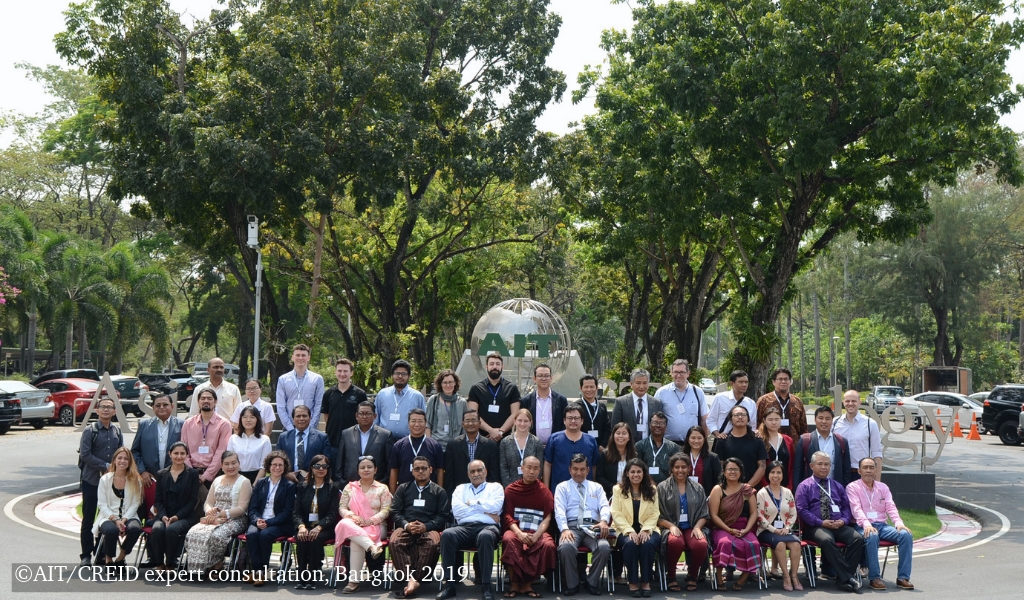Religious inequalities, discrimination and conflict, driven by religious nationalism and ethnic tensions, are increasing challenges for many countries in East Asia. Last month, over 80 delegates from a broad spectrum of academic, development practice, civil society and religious backgrounds gathered at the Yunus Centre, Asian Institute of Technology (AIT) in Bangkok, to discuss how efforts to tackle poverty and ‘leave no one behind’ can be made more sensitive and responsive to religious inequalities.

Co-hosted IDS on behalf of the Coalition for Religious Equality and Inclusive Development (CREID) over 20 participants came from Myanmar, bringing first-hand experiences to the discussions. Participants came from a range of religious and ethnic backgrounds, including Buddhist, Christian, Muslim and Hindu.
Throughout both days, it was clear that discrimination on the grounds of religion or belief can have huge implications on all aspects of people’s lives: whether in education, health, politics, or security – all key areas of focus for the Sustainable Development Goals and global development more broadly. As well as forcing people from their homes and their land, conflict fuelled by religious and intersecting inequalities can also spill over into other forms of violence and crime such as trafficking and violence against women.
Social, religious and morals issues are blind spots in development
AIT Extension’s Executive Director, Jon Shaw, who opened the event, went straight the point and the underlying philosophy behind the work of CREID: “It’s clear to me that religion is one of these issues that is a blind spot in development. Social, religious and moral issues are often blind spots for technical experts, like computer scientists or water modellers”.
Director of CREID, Professor Mariz Tadros, picked up where Dr Shaw left off, presenting ambitions and hopes of the CREID programme.
“We are keen to get issues of religious inequalities beyond the silo in which they take place… we want this to be interdisciplinary, whether across climate change, education, enterprise, health or technology.”
Professor Tadros alluded to the magnitude of the task: “However, we have no illusions: poverty reduction is not a magic bullet for religions tensions.”
Experiences from Myanmar
Four participants from Myanmar were invited to share their views and experiences on a panel: Kathleen Thein (Hindu Women’s Network), Ashin Zero (a young Buddhist monk who is very active in countering intolerance and promoting inter-religious harmony), May Sabe Phyu (Gender Equality Network) and Naeem, also known as Khin Maung Myint (a Rohingya activist).
May Sabe Phyu highlighted how a “”We” and “them” attitude is part of problem… It starts from a name, yet we live on the same land and off the same resources.” She stressed how “we need to promote a culture of listening to each other.”
Naeem described the plight of the Rohingya and the acts of impunity perpetrated against them in clear and unwavering terms. “Where is the law? All we can do is scream and cry.” He added “Diversity needs to be in equilibrium – but ethnicity and religion can be used as energy to disturb this balance”.
From the floor, others from Myanmar contributed to the discussion.
Dr Sasa San, a doctor from Chin State and founder of Health and Hope, flagged up the multitude of languages spoken in Myanmar, and the importance of education in supporting social cohesion rather than sowing the seeds of division (such as the Ma Ba Ta schools of indoctrination).
“I am not alone”, expressed Fortify Rights activist, Nickey Diamond, who welcomed the presence of participants from this wide range of religions and backgrounds, who may not have been able to gather and discuss these issues in this way in Myanmar.
Assessing the impact of assaults on religion and freedom of belief in the region
An expert panel, chaired by Professor Abdeldayem Nossair from the World Organisation of Al Azhar Graduates, a CREID partner, then took a wider view of the impact of assaults on freedom of religion or belief (FoRB) in the region. They included Dr Faiz Shah Head of Development Management at AIT, and Director YCA; Dr Sunsanee McDonnell from the Preventing Violent Extremism programme at the UNDP, Rev. Hee Seng Kok from the International Churches of Thailand and Dr. Dipendra KC, Assistant Dean of Academic Affairs at Thamassat University.
Both Dr Faiz Shah, AIT, and Rev. Hee Seng Kok stressed the presence of fear as a key consequence of religious or ethnic minority discrimination and persecution. Dr Shah described how such “a state of fear among persecuted groups leads to underground discontent that often leads to cycles of violence”, while Rev. Seng elaborated that in his experience with refugee groups, “it can take three years for people to get over fear”.
Dr Sunsanee McDonnell from the UNDP described the importance of creating alternative narratives. Dr. Dipendra KC highlighted that curbing FoRB leads to a deterioration in community trust, saying that for example in Nepal it’s no longer possible for a faith-based organisation to operate without being accused of trying to convert beneficiaries.
Participants also shared experiences of the harmful impact of indoctrination (in a particular and often narrow set of religious beliefs) on social harmony.
On the second day, participants delved deeper into the issues, looking through the religious inequalities lens at issues of education, health, women’s empowerment, the role of youth and the role of culture and the media. The interface between religious inequalities and conflict brought some issues into stark relief, such acts of violence against women including rape and its consequences, such as unwanted pregnancies and children.
Reflecting on the event, Benedict Rogers, from human rights organisation CSW, a CREID partner, said “in sensitive contexts, the mere act of coming together to discuss these issues safely and honestly is already a stepping stone.”
CREID Director, Professor Mariz Tadros said “as well as seeding new thoughts and connections, these discussions will go a long way into shaping CREID programmatic implementation.”